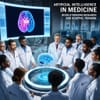Artificial intelligence is transforming the healthcare industry in various ways, from streamlining hospital operations to enhancing patient care. AI's impact on healthcare is multifaceted, and its applications are numerous.
In the realm of predictive analytics, AI can analyze electronic health records to predict disease onset, hospital readmission risks, and potential adverse drug reactions. For instance, Mount Sinai Health System uses an AI algorithm to predict acute kidney injury with over 90% accuracy. This technology has the potential to revolutionize the way healthcare professionals approach patient care.
AI is also being used to create personalized treatment plans based on a patient's genetics, lifestyle, and medical history. Platforms like IBM Watson for Oncology recommend individualized cancer treatments by analyzing patient medical records and scientific literature. This approach enables doctors to provide more targeted and effective care.
Virtual health assistants, powered by AI, are another area where technology is making a significant impact. Chatbots like Babylon Health, Ada, and Buoy Health offer preliminary medical advice, symptom checking, and appointment scheduling, providing 24/7 access to health information.
In medical imaging diagnostics, AI algorithms detect diseases earlier and with greater accuracy than traditional methods. For example, AI can detect tumors, fractures, and hemorrhages in X-rays, CT scans, and MRIs. This technology has the potential to improve patient outcomes and reduce the burden on healthcare professionals.
Remote patient monitoring is another area where AI is being used to great effect. Wearable devices powered by AI track health data, detect irregular heartbeats, and alert users to health issues. This enables patients to track their health remotely and consult doctors via AI chatbots.
To leverage AI's potential in healthcare, professionals can benefit from specialized training programs. These programs cover key AI technologies, machine learning, natural language processing, and computer vision, enabling healthcare professionals to evaluate AI tools and improve clinical outcomes.
As AI continues to evolve, we can expect significant advancements in federated learning, precision medicine, and robotic-assisted procedures. AI-powered robots will enhance surgical precision and efficiency, reducing recovery times and improving patient outcomes. The future of AI in healthcare is promising, and its potential to transform the industry is vast.


